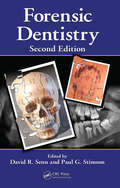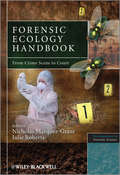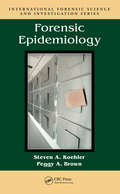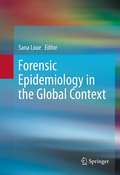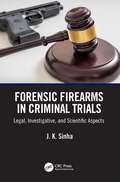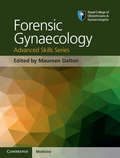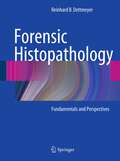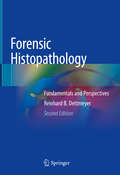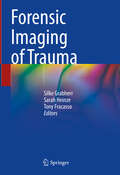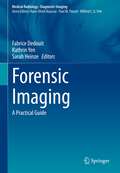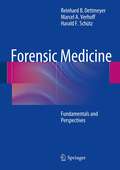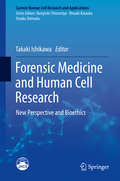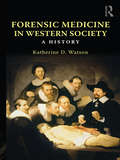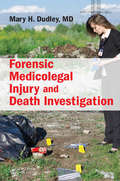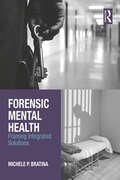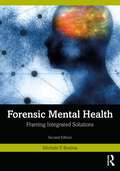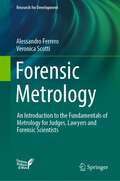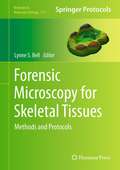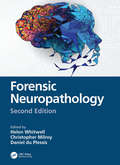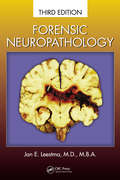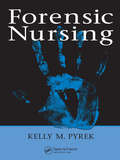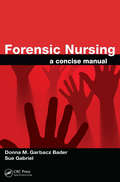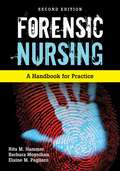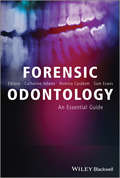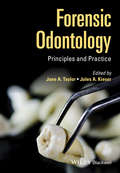- Table View
- List View
Forensic Dentistry
by David R. Senn Paul G. StimsonThe identification of unknown individuals and the estimation of age, race, and gender are among the chief functions of forensic dentistry. Other important applications include the investigation and analysis of bitemarks and oral injuries in abuse cases and evaluating, reporting, and testifying in civil litigation cases. Twelve years after the benchmark first edition of this book explored these topics, the long-awaited Forensic Dentistry, Second Edition offers a comprehensive update and revision of the material.Offering insight from many new contributors on the cutting edge of forensic science and odontology, this new edition expands the book’s scope to include a broader historical and theoretical analysis, a thorough assessment of the past decade’s developments, and a far-reaching projection of future trends.New topics in the second edition include: Forensic dental radiography Age estimation Jurisprudence and legal issues History of forensic dentistry Landmark cases, including September 11th and Hurricane Katrina In order for forensic odontology to continue to progress as a specialty of forensic science, there must be a consistent stream of new ideas and original and applied research. Heavily illustrated and enhanced with a 16-page color insert with additional photos, this volume captures the critical issues that confront today’s forensic dentist, explores the field’s limitations, and provides a window on the future of this crucial sector within the forensic identification science arena.
Forensic Ecology Handbook
by Nicholas Márquez-Grant Julie RobertsThe analysis of plants, insects, soil and other particulates from scenes of crime can be vital in proving or excluding contact between a suspect and a scene, targeting search areas, and establishing a time and place of death. Forensic Ecology: A Practitioner's Guide provides a complete handbook covering all aspects of forensic ecology. Bringing together the forensic applications of anthropology, archaeology, entomology, palynology and sedimentology in one volume, this book provides an essential resource for practitioners in the field of forensic science, whether crime scene investigators, forensic science students or academics involved in the recovery and analysis of evidence from crime scenes.Forensic Ecology: A Practitioner's Guide includes information not only on the search, location, recovery and analysis of evidence, but includes sampling strategies for diatom analysis, pollen and soils samples and entomology and provides guides for good practice. Each chapter provides background information on each discipline and is structured according to pre-scene attendance (what questions should the scientist ask when receiving a call? What sort of preparation is required?), scene attendance (including protocols at the scene, sampling strategies, recording), scientific examination of analysis of the evidence up to the stages and guidelines for witness statement and presenting evidence in court.The book is written by specialists in all fields with a wealth of experience who are current forensic practitioners around the world. It provides an essential and accessible resource for students, academics, forensic practitioners and police officers everywhere.
Forensic Epidemiology (International Forensic Science and Investigation)
by Steven A. Koehler Peggy A. BrownAfter 9/11, forensic epidemiology emerged as a leading investigative tool, partnering public health officers with law enforcement like never before. Based on the authors first-hand experience, Forensic Epidemiology brings to light the vast amounts of information collected by medical examiners that will be useful in advancing death investigation te
Forensic Epidemiology in the Global Context
by Sana LoueAs globalization causes profound changes in business, industry, and trade,it can also have significant effects on populations, environments, and individuals.These effects may be harmful, resulting in injury or illness, prompting the critical question: How best to correct wrongs caused to individuals, communities, and/or the environment of one country by the actions of individuals or corporations of another? Possible answers lie in an emerging discipline. Forensic Epidemiology in the Global Context opens meaningful windows onto the processes of forensic epidemiology, the roles of the epidemiologist in civil disputes, and the potential contribution of the field to legal and justice efforts worldwide. Case examples from the U.K., Nigeria, Ecuador, Romania, and Australia illustrate commonly used methodologies and the challenges involved in their use in U.S. and international courts of law. A chapter on expert testimony takes readers through qualification and admissibility issues, report requirements, and working with attorneys. Included in the coverage: Forensic epidemiology in the international legal arena.The epidemiologist as an expert in litigation.Epidemiological evidence in tort law: dispatches from the U.K.Liability for occupational exposure: the role of epidemiology.Forensic epidemiology and environmental justice.Forensic epidemiology, pathology, ethnics, and human rights.By emphasizing both the scientific and legal components of the equation, Forensic Epidemiology in the Global Context gives researchers and graduate students in epidemiology a unique and timely guide to the present and future of an increasingly salient field.
Forensic Firearms in Criminal Trials: Legal, Investigative, and Scientific Aspects
by J. K. SinhaOver the last two‑plus decades, the scientific validity of the principles that underpin identifying a firearm from recovered fired ammunition has been a core issue for the admissibility of expert evidence in criminal trials in the United States. The issues that dominated the determinative points, as they related to the scientific and technological analysis, centered around the following: the validity of uniqueness of firearms, subjective methodology, the potential rate of error, unknown statistical certainty and unsatisfactory proficiency tests. These issues have essentially become the legal requirement for admissibility of experts’ opinion on the linkage of firearms with fired ammunition, an important forensic opinion that connects the crime with the perpetrator through the weapon of offence.In Forensic Firearms in Criminal Trials: Legal, Investigative, and Scientific Aspects, internationally renowned forensic firearm expert Dr J. K. Sinha provides demonstrative explanations and helpful clarifications using simple illustrative examples from scientific casework and everyday life. The goals are to: Prove the scientific validity of the uniqueness of identifying features of firearms Identify the statistical threshold to qualify and determine a corresponding match Debunk the misconception of subjective methodology and the potential rate of error thereof in experts’ decision making and opinions Clarify the prevailing perception of similar, dissimilar and insufficient marks and consequential interpretation With certain non‑technical readers in mind as well, the book provides a basic understanding of the general make‑up of firearms and ammunition, the evidentiary values of commonly used firearms, fired empties, fired bullets and pellets, and scientific investigative leads that result from visual and physical evidence. Chapters cover related topics such as proficiency tests, identifying competent experts, admitted firing, and reliable and testable methodology. The book also reviews the admissibility of expert evidence in India and explains the proviso of admissibility of ballistic expert report in criminal trials. Throughout, the author emphasizes the need for requisite forensic knowledge by the investigator and aided by a competent expert for effective scientific investigation of gunfire crimes such as would aid in the proper presentation of scientific evidence at criminal trial for a successful outcome.
Forensic Gynaecology
by Maureen DaltonThis comprehensive book covers the care of victims of sexual and domestic violence. Containing much practical advice - including writing legal reports and court skills, and issues of consent and capacity - the content highlights throughout the need to provide good-quality care to victims, not just for successful prosecutions but, more importantly, for the sake of the victim's mental and physical health. There are chapters on important topics such as child sex exploitation, female genital mutilation, male victims, training, and psychological issues. The content covers the syllabi for DFCASA, MFFLM(SOM) Part 2, and the RCOG ATSM in forensic gynaecology. This book is recommended for gynaecologists, sexual health doctors and nurses, genitourinary medicine doctors and nurses, emergency medicine doctors and nurses, midwives, counsellors and psychologists who work with victims, paediatricians, forensic doctors and nurses, specialist police officers and lawyers, and those working in sexual assault referral centres and independent sexual violence advisers.
Forensic Histopathology
by Reinhard B. DettmeyerThis book, which combines the features of an atlas and a textbook, presents findings in forensic histology, immunohistochemistry, and cytology based on microscopic investigations using different stainings and different antibodies. The principal aim is to provide practitioners with detailed information and guidance on how microscopy can help to clarify the cause of sudden and unexpected death. Many of the topics will be of interest not only to forensic pathologists but also to general pathologists, whether practitioners or researchers. Examples include the pathology of drug abuse, wound age determination, adverse drug reactions, histopathology of the sudden infant death syndrome, and age determination of myocardial infarction. Both typical and unusual findings are demonstrated with the aid of numerous high-quality color illustrations, and other key literature in forensic histology and immunohistochemistry is highlighted for each topic.
Forensic Histopathology: Fundamentals And Perspectives
by Reinhard B. DettmeyerThis second edition, which combines the features of an atlas and a textbook, presents findings in forensic histology, immunohistochemistry, and cytology based on microscopic investigations using different stainings and different antibodies. Questions of quality when working in the field of forensic histology are included as well as scientific perspectives for further research. The principal aim is to provide practitioners with detailed information and guidance on how microscopy can help to clarify the cause of sudden and unexpected death. Therefore additional and particularly rare histopathological findings are presented. Many of the topics will be of interest not only to forensic pathologists but also to general pathologists, whether practitioners or researchers. Examples include the pathology of drug abuse, wound age determination, adverse drug reactions, histopathology of the sudden infant death syndrome, and age determination of myocardial infarction. Both typical and unusual findings are demonstrated with the aid of numerous high-quality color illustrations, and other key literature in forensic histology and immunohistochemistry is highlighted for each topic.
Forensic Imaging of Trauma
by Silke Grabherr Sarah Heinze Tony FracassoForensic Imaging is increasingly gaining importance in post-mortem and medico-legal investigations, particularly in cases of trauma. Indeed, the digitization of a body, serving as evidence in court, has become standard practice in many countries. To analyze forensic images effectively, one must possess expertise not only in radiological interpretation but also in understanding post-mortem changes as well as the morphology of lesions and their medico-legal implications. Neither of the two disciplines involved, Radiology and Forensic Medicine, can fully provide the necessary knowledge individually. Hence, Forensic Radiology is now recognized as a discipline that integrates both specializations. This book aims to bridge the gap between these two fields by elucidating the morphology of specific trauma-related lesions. It seeks to assist in identifying these lesions in forensic images and interpreting them accurately from a medico-legal perspective.The introductory chapter clarifies the distinctions between radiological interpretation and medico-legal imaging interpretation. It subsequently presents various techniques used in Forensic Imaging, outlining their respective advantages and limitations. Furthermore, this book is the first to comprehensively cover various types of trauma encountered in forensic medicine, including blunt trauma, sharp trauma, ballistic trauma, thermal trauma and explosions. A separate chapter is dedicated to each of them. Additionally, it addresses specific commonly observed cases such as traffic accidents, asphyxia and child abuse in dedicated chapters.Each chapter provides a concise summary of the essential medico-legal background and knowledge crucial for the final interpretation. It then outlines the appropriate radiological techniques for investigating the specific trauma and offers practical tips for image acquisition. Radiological findings are subsequently listed and illustrated in corresponding figures. Finally, the book explains the medico-legal interpretation of the observed findings and provides guidance on how to report them. This book represents a pioneering effort to amalgamate the knowledge of forensic medicine and radiology regarding the interpretation of various trauma cases. It serves as a valuable handbook for every practitioner in this field, offering practical insights from image acquisition to the ultimate interpretation of collected data.
Forensic Imaging: A Practical Guide (Medical Radiology)
by Kathrin Yen Fabrice Dedouit Sarah HeinzeThis superbly illustrated book examines all aspects of the use of modern post-mortem imaging in forensic investigations, which has flourished since the introduction of multidetector computed tomography and magnetic resonance imaging. Readers will find guidance on the applications of all relevant imaging modalities and contrast media. Analogies and differences between forensic and clinical imaging are highlighted, and it is explained what lessons forensic imaging holds for clinical radiology, and vice versa. The remainder of the book comprehensively documents the typical “normal” post-mortem findings and the imaging presentations in various forms of trauma and nontraumatic forensic cases, including those in which medical liability may be an issue. The authors are radiologists and forensic radiologists from across the world who have extensive experience in post-mortem imaging. The book is primarily intended for forensic pathologists, radiologists, and radiographers seeking practical information on forensic imaging, but it will also be of interest to others, such as lawyers, who encounter this specialty during their professional activities.
Forensic Medicine
by Reinhard B. Dettmeyer Marcel A. Verhoff Harald F. SchützThis book presents the latest developments in the field of forensic pathology/forensic medicine, including important advances in forensic histopathology, forensic radiology, medical malpractice, understanding of child abuse, and forensic toxicology. Various forms of trauma are addressed in individual chapters, and among the other topics covered are traffic medicine, forensic alcohol toxicology, forensic DNA analysis, forensic osteology, and international regulations. The book includes a wealth of color illustrations and numerous tables presenting key facts. The authors are leading experts in general pathology, forensic radiology, and forensic toxicology. Forensic Pathology/Forensic Medicine: Fundamentals and Perspectives will be of interest not only to specialist pathologists and those working in forensic medicine, but also to coroners, forensic physicians, students, lawyers, attorneys, and policemen.
Forensic Medicine and Human Cell Research: New Perspective And Bioethics (Current Human Cell Research And Applications Ser.)
by Takaki IshikawaThis volume reviews the application of biochemical and molecular pathologies, which are based on conventional pathomorphology, toxicology, and DNA analysis technologies, not only to autopsies but also to the field of clinical medicine in general. The systematic and integrated use of biochemical, immmunohistochemical, and molecular pathology, toxicology, DNA analysis, and cell culture investigations reinforces the pathophysiological diagnostic criteria in a forensic autopsy for clinical diagnosis. The use of these technologies can help to determine the cause and process of death and characterize the functional pathophysiological changes in the body that occur during the death process. Recently, the systematization of the latest supplemental tests, diagnostic methods, and quality control has allowed us to conduct comprehensive data collection and analysis for a range of diseases. This book presents the latest findings on the pathology of a broad range of human diseases, based on data concerning postmortem biochemistry and molecular biology collected from approximately 1000 people. Further, it puts forward a code of ethics for undertaking pathophysiological research and describes research techniques for uncovering pathophysiological mechanisms. As such, it offers a unique resource for researchers in the field of forensic medicine and pathology, and for clinicians.
Forensic Medicine in Western Society: A History
by Katherine D. WatsonThe first book of its kind, Forensic Medicine in Western Society: A History draws on the most recent developments in the historiography, to provide an overview of the history of forensic medicine in the West from the medieval period to the present day. Taking an international, comparative perspective on the changing nature of the relationship between medicine, law and society, it examines the growth of medico-legal ideas, institutions and practices in Britain, Europe (principally France, Italy and Germany) and the United States. Following a thematic structure within a broad chronological framework, the book focuses on practitioners, the development of notions of ‘expertise’ and the rise of the expert, the main areas of the criminal law to which forensic medicine contributed, medical attitudes towards the victims and perpetrators of crime, and the wider influences such attitudes had. It thus develops an understanding of how medicine has played an active part in shaping legal, political and social change. Including case studies which provide a narrative context to tie forensic medicine to the societies in which it was practiced, and a further reading section at the end of each chapter, Katherine D. Watson creates a vivid portrait of a topic of relevance to social historians and students of the history of medicine, law and crime.
Forensic Medicolegal Injury and Death Investigation
by Mary H. Dudley, M.D.Introducing the basic concepts of clinical forensic medicine and death investigation, this book covers the main areas of forensic investigation . It provides an introduction to forensic science and coverage of injury patterns, natural disease, accidental trauma, child injury and fatalities, and domestic violence. Anyone who has direct contact with death, crime, and the medicolegal system, including nurses, physicians, attorneys, death investigators, forensic pathologists, and police detectives, will find this an invaluable reference.
Forensic Mental Health: Framing Integrated Solutions
by Michele P. BratinaForensic Mental Health: Framing Integrated Solutions describes a criminal justice–mental health nexus that touches every population—juvenile and adult male and female offenders, probationers and parolees, the aging adult prison population, and victims of crime. In the United States today, the criminal justice system functions as a mental health provider, but at great cost to society. The author summarizes the historical roots of this crisis and provides an overview of mental illness and symptoms, using graphics to illustrate the most prevalent disorders encountered by police and other first responders. Bratina demonstrates in detail how the Sequential Intercept Model (SIM) supports integration of the U.S. healthcare and justice systems to offer more positive outcomes for offenders with mental illness. This book takes a multidisciplinary approach, addressing social work, psychology, counseling, and special education, and covers developments such as case-law related to the right to treatment and trauma-informed care. Designed for advanced undergraduates, this text also serves as a training resource for practitioners working with the many affected justice-involved individuals with mental illness, including juveniles, veterans, and substance abusers.
Forensic Mental Health: Framing Integrated Solutions
by Michele P. BratinaIn this book author Michele P. Bratina demonstrates how the Sequential Intercept Model (SIM) supports integration of the U.S. healthcare and justice systems to offer more positive outcomes for offenders with mental illness. The book describes a criminal justice–mental health nexus that touches every population—juvenile and adult male and female offenders, probationers and parolees, the aging adult prison population, and victims of crime. In the United States today, the criminal justice system functions as a mental health provider, but at great cost to society. The author summarizes the historical roots of this crisis and provides an overview of mental illness and symptoms, using graphics, case studies, and spotlight features to illustrate the most pressing issues encountered by justice and behavioral health professionals and the populations they serve. Forensic Mental Health takes a multidisciplinary approach, addressing social work, psychology, counseling, and special education, and covers developments such as case law related to the right to treatment and trauma-informed care. Designed for advanced undergraduates, this text also serves as a training resource for practitioners working with the many affected justice-involved individuals with mental illness and co-occurring substance use disorders, including juveniles and veterans.
Forensic Metrology: An Introduction to the Fundamentals of Metrology for Judges, Lawyers and Forensic Scientists (Research for Development)
by Alessandro Ferrero Veronica ScottiThis book offers up-to-date information and guidance on the application of metrology in legal proceedings, clarifying the limits of validity of scientific evidence and presenting an illuminating series of case studies in which measurement uncertainty has played an important role. The fundamental concepts of metrology are discussed, and it is explained how metrology is capable of quantifying the reliability of measurement results and thereby contributing to appropriate decision making. With the aid of the presented case studies, this book will assist readers in understanding how legal decisions should be made in the presence of uncertainty. Areas covered in those studies include breath alcohol concentration analysis, and DNA profiling. Nowadays, decisions in most legal cases are based on evidence obtained through scientific analysis involving the acquisition of accurate measurements. Against this background, Forensic Metrology will be of value for lawyers and judges in both civil and common law countries, as well as engineers and other scientists with an interest in the subject.
Forensic Microscopy for Skeletal Tissues
by Lynne S. BellForensic anthropology deals with human remains usually in the skeletonized form. The application of microscopy to skeletal tissues is well established and used routinely in biomedical science. Its adaptation to forensic questions is an increasing area of interest, and publications utilizing microscopy have increased in the scientific literature. In Forensic Microscopy for Skeletal Tissues: Methods and Protocols, expert researchers in the forensic, archeological and paleontological disciplines, and detail many of the methods which are now commonly used to study skeletal material. These methods include differing forms of light, confocal, scanning electron and transmission electron microscopy. Written in the highly successful Methods in Molecular BiologyTM series format, chapters include introductions to their respective topics, lists of the necessary materials and reagents, step-by-step, readily reproducible laboratory protocols, and key tips on troubleshooting and avoiding known pitfalls. Authoritative and practical, Forensic Microscopy for Skeletal Tissues: Methods and Protocols bring together differing forms of microscopy that are used in association with forensic anthropology, or have relevance to questions concerning forensic anthropology.
Forensic Neuropathology
by Helen Whitwell Christopher Milroy Daniel Du PlessisForensic neuropathology is an important specialty within forensic pathology. In addition to traumatic brain injury in the adult and child, forensic neuropathologists must also consider the role of natural disease within the forensic setting such as cerebrovascular disease, as well as neurotoxicology. Focusing on difficulties that arise in the medico-legal context, the chapters include techniques for the post-mortem examination of the brain and related structures. Forensic pathologists, neuropathologists, general pathologists, clinical forensic specialists as well as neuroscientists, neurologists and neurosurgeons will all find useful information. In addition, members of the legal profession have found this an important reference work. Chapters have been extensively revised and new content includes - Chronic traumatic encephalopathy-related pathology - Sudden unexplained death in epilepsy - Biomechanics of head injury - Updates on pathological aspects of head injury including infant head injury with ocular pathology - Clinical aspects of head injury and spinal injury including a new chapter on neuroradiology Reviews of the First Edition This outstanding book is unique. Well-illustrated with high-quality colour photographs and line drawings, it reads well. Strongly recommended for trainees in histopathology, neuropathology, paediatric pathology, and forensic pathology, as well as for consultants practising in these fields.
Forensic Neuropathology
by Jan E. LeestmaThe field of forensic neuropathology covers such controversial topics as the effects of repeated brain trauma in football players and how babies probably cannot die from being shaken. Jan Leestma is one of the most respected voices in this area. A timely update to his classic reference, Forensic Neuropathology: Third Edition presents an encyclopedi
Forensic Nursing
by Kelly M. PyrekWritten by an award-winning investigative journalist with more than twenty years of experience, Forensic Nursing takes an objective yet engaging look at a profession that according to the author, "is only for those with a strong stomach, a pure heart, and a quick mind." It presents the personal experiences and perspectives of forensic nurses that w
Forensic Nursing: A Concise Manual
by Donna M. Garbacz Bader Sue GabrielThe forensic nurse has a powerful role in medical-legal investigations. Going beyond the nurse‘s traditional role, forensic nurses are often at the forefront of evidence collection and preservation. They can maintain an evidentiary chain of custody, testify as an expert witness in a court of law, care for victims, assist victims families, and work
Forensic Nursing: A Handbook for Practice
by Rita Hammer Barbara Moynihan Elaine M. PagliaroDeveloped within a holistic, caring framework, and well grounded in theory and research, the Second Edition continues to provide a unique and comprehensive look at forensic nursing from an interdisciplinary perspective, and addresses the need for collaborative practice and skill in caring for victims of violence and disaster, as well as in competently assisting in investigations. New information has been included on human trafficking, sexual predators and the internet, and elder abuse.
Forensic Odontology
by Sam Evans Romina Carabott Catherine AdamsAn accessible, essential introduction to forensic odontology. Written by a team of well-established, active practitioners in the field, Forensic Odontology is invaluable for those needing an introduction to the subject for the general dental practitioner who has an interest in forensic dentistry and is contemplating practicing in the field. It will also be useful as a reference during practice. After a brief introduction the book covers dental anatomy and development, expert witness skills, mortuary practice, dental human identification, disaster victim identification, dental age assessment, bite marks, forensic photography and the role of the forensic odontologist in protection of the vulnerable person. Chapters outline accepted and recommended practices and refer to particular methodologies, presenting different schools of thought objectively.
Forensic Odontology
by Jules Kieser Jane TaylorForensic odontology refers to the science and practice of dentistry which may be applied to help solve litigation in both criminal and civil cases. It is a specialist branch of dentistry that assists the legal system in the handling, analysis and interpretation of dental evidence.Forensic Odontology: Principles and Practice pulls together the very latest research findings and advice on best practice and essential skills, including aspects of forensic science that provide a well-rounded educational experience for the reader. Chapters provide coverage of anatomy and morphology, mortuary techniques, physical anthropology, applied forensic sciences, child and elder abuse, and facial approximation. The text introduces the various topics and discusses underpinning philosophies without being an exhaustive historical treatise. Appropriate case studies are used to highlight issues, and references to current research are provided to stimulate further reading and research.Written by experienced practitioners in the field, this informative introductory text is invaluable to graduate and undergraduate students, as well as experienced dentists, wishing to gain experience or pursue a career in forensic odontology. This text will be a welcome addition to the forensic odontological libraries of all practicing forensic odontologists.
